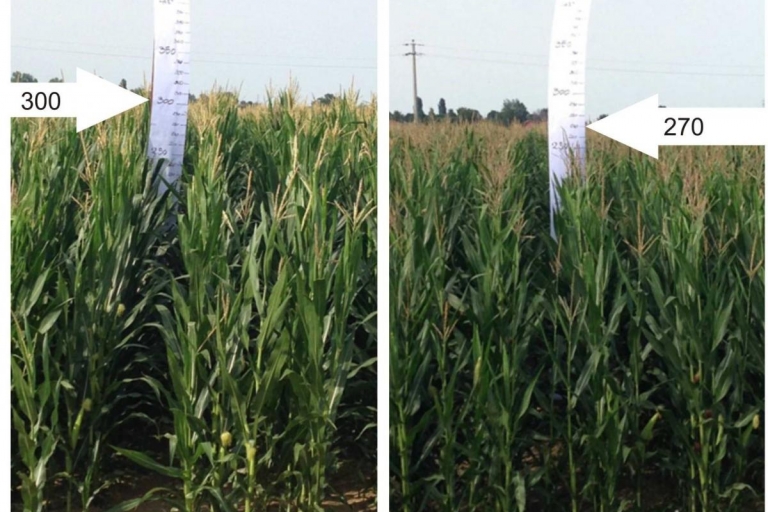Ecological and organic agriculture
You are here
Why the organic production a future has
Did you know that the turnover of organic products grows faster than the agricultural area dedicated to it? An opportunity for the farmer to expand and to achieve a higher turnover.
Organically grown crops and products, mainly food stuffs, but also clothing, are increasingly present in the market. Of course in specialized stores, but increasingly also in mainstream shops and even in low-cost supermarkets. Organic products are no longer niche products. The growth numbers of the last 10 years confirm this evolution and speak for themselves. Curious? Come and see!
The numbers are on the rise
In the European Union, the area dedicated to organic farming doubled between 2005 and 2015 from 6 million hectares to 12.7 million hectares. This represents almost 5.7% of the total agricultural area in the EU.
At the same time, we see a similar trend worldwide: an increase from 28.3 million hectares to 50.9 million hectares.
The turnover of organic products is growing even stronger: in the European Union from EUR 11.8 billion in 2005 to EUR 30 billion in 2015 (+ 150%). Globally, increased the turnover from 23.6 billion to 75.9 billion (+221%) in the same period.
The growth continues
We expect this trend to continue in the following decade. Countries that only started to follow this trend recently, are now catching up. We also find that the market of organic products grows faster than the agricultural area used for the production of these products. In 2014, turnover of organic products increased by 7,4%, whereas an increase of only 1.1% of the land use was registered. This difference in growth is offset by:
- a higher production per land unit
- higher prices
- imports from outside the EU: an increase of 11%
Ready to participate in the profit?
This is certainly a great opportunity for European organic farmers to increase their production and thus to remain in line with market demand.
Yields in organic farming are traditionally lower than in conventional agriculture. But this is changing quickly. There are new technologies and new developments that increase the yields: for example, pest control through natural predators, precision farming, better soil management ... The difference with traditional farming is getting smaller because of this increased production per land unit. Thanks to this evolution, we must not sacrifice too much land for this conversion toward a more organic farming.
Locally grown organic products have an advantage
The consumer of organic products is also sensitive to CO2 emissions and food miles. Thus, the European organic farmer is sure for a market of his products. In fact, their products will always be preferred to imports.
For those who prefer something different: other ecological alternatives are available
In addition to organic farming, there are still many other production systems with an ecological approach. Biodynamic agriculture, integrated agriculture, sustainable agriculture, ... are just a few of them. All aiming at the same goal:
- promote more efficient applications of use of raw materials,
- reduce the impact of the agriculture on our environment and the our ecosystems
- sustainability
- respect for all human beings, from the farmer and farm worker up to the consumer
The numbers of these different production systems are very fragmented and not easy to obtain, but they undoubtedly show a trend towards a more sustainable and healthier agricultural production.
Sustainable agriculture as the only perspective
Even in conventional agriculture, we see a tendency towards a healthier and greener agricultural production:
- new molecules developed for plant protection must meet many more stringent requirements.
- residue levels are reduced continuously
- alternative plant protection is sometimes economically more interesting than traditional pesticides.
- Precision farming uses less fertilizers, pesticides and water.
- there is a lot of attention to proper soil management (use of cover crops, green manure, mulching etc.).
All these trends are needed to continue to sustainably produce food for the growing world population in the coming decades.
Foliar fertilization: a step towards sustainability
Efficient fertilization is a small but important part in the evolution towards more sustainable agriculture. Precision fertilization, an integrated vision of plant nutrition including all nutrients (mayor elements (N, P, K), mesoelements (Ca, Mg, S) and microelements (B, Mo, Cu, Fe, Zn, Mn)) in a complete fertilization programme, and foliar fertilization are important ancillary means for the farmer to keep his production at a high level, including with a considerable reduction of all types of inputs and raw materials (from 25 to 75%). Fertilizer optimization programmes will also reduce potential contamination of the soil, groundwater as well as surface water. BMS Micro-Nutrients plant fertilization programmes contribute to this and are a step in the right direction.
References:
FiBL (2017): Data on organic agriculture 2005-2015. The Organic-World.net website mainained by the Research Institute of Organic Agriculture (FiBL), Frick, Switzerland. Data available at http://www.organic-world.net/statistics/
